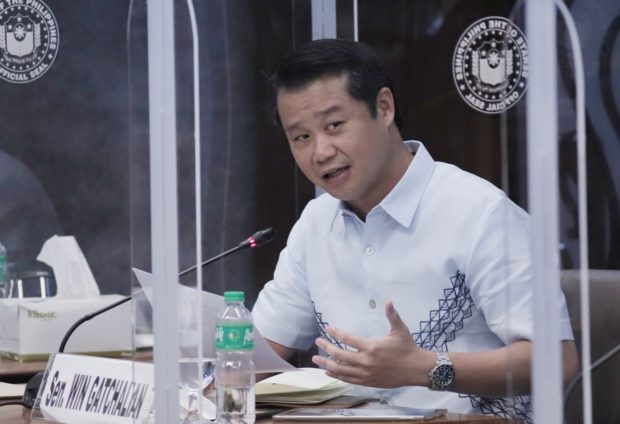Gatchalian to ERC, power firms: Extend ‘no disconnection’ policy until GCQ ends

Sen. Win Gatchalian. Senate PRIB file photo / Joseph Vidal
MANILA, Philippines — Senator Sherwin Gatchalian on Thursday urged the Energy Regulatory Commission (ERC) and power companies to extend its “no disconnection” policy for low-income consumers until the end of the government-imposed general community quarantine (GCQ).
“Habang hindi pa humuhupa ang pandemya, patuloy pa rin sana ang pagiging maluwag ng distribution utilities (DUs) tulad ng Meralco pagdating sa pagbabayad ng kuryente,” Gatchalian, chair of the Senate energy committee, said in a statement.
(While the pandemic has not yet subsided, I hope distribution utilities (DUs) like Meralco will continue to be lax when it comes to paying for electricity.)
“Humanitarian consideration sana ang pinaiiral upang mas matugunan ang pangangailangan ng marami,” he added.
(Humanitarian consideration should be implemented to meet the needs of many.)
Article continues after this advertisementThe ERC earlier ordered power distributors to stop disconnecting the power supply of low energy consumption households due to unpaid bills until the end of 2020.
Article continues after this advertisementFor Meralco, it extended its “no disconnection” policy until Jan. 31 this year.
The policy, which covers households consuming 200-kilowatt hour (kWh) per month and below, benefits over three million of its customers, Gatchalian noted.
The senator reminded DUs that the majority of businesses in the country are still not operating in their full capacity and that unemployment remains to be a problem.
Citing a nationwide survey conducted by Pulse Asia in Nov. 2020, Gatchalian noted that 58 percent of 2,400 respondents either lost their job or source of income.
Those belonging to Class D and E were affected the most, according to the lawmaker, as 58 percent and 64 percent of them ended up having no means of livelihood.
Meanwhile, the Philippine Statistics Authority earlier reported that as of October last year, unemployed Filipinos reached 3.8 million, the highest in 15 years, compared to the previous year’s 2.1 million, he added.
Gatchalian said that it would be better to extend the “no disconnection” policy until the end of quarantine, especially for low-income consumers.
“Hindi pa napapanahon para ipatupad ang nakagawiang paniningil sa due date ng bill ng kuryente lalo na sa mga low-income consumers,” he said.
(It is not yet time to implement routine billing on the due date of the electricity bill, especially for low-income consumers.)
“Kakatapos lang ng Pasko at marami ang pinilit na ipagdiwang ito sa abot ng kanilang makakaya. Mas makabubuting palawigin pa ang ‘no disconnection’ policy hanggang sa matapos ang quarantine,” he added.
(The Christmas season just ended and many were forced to celebrate it to the best of their ability. It would be better to extend the ‘no disconnection’ policy until the quarantine is over.) Zac Sarao, INQUIRER.net trainee
JPV
For more news about the novel coronavirus click here.
What you need to know about Coronavirus.
For more information on COVID-19, call the DOH Hotline: (02) 86517800 local 1149/1150.
The Inquirer Foundation supports our healthcare frontliners and is still accepting cash donations to be deposited at Banco de Oro (BDO) current account #007960018860 or donate through PayMaya using this link.